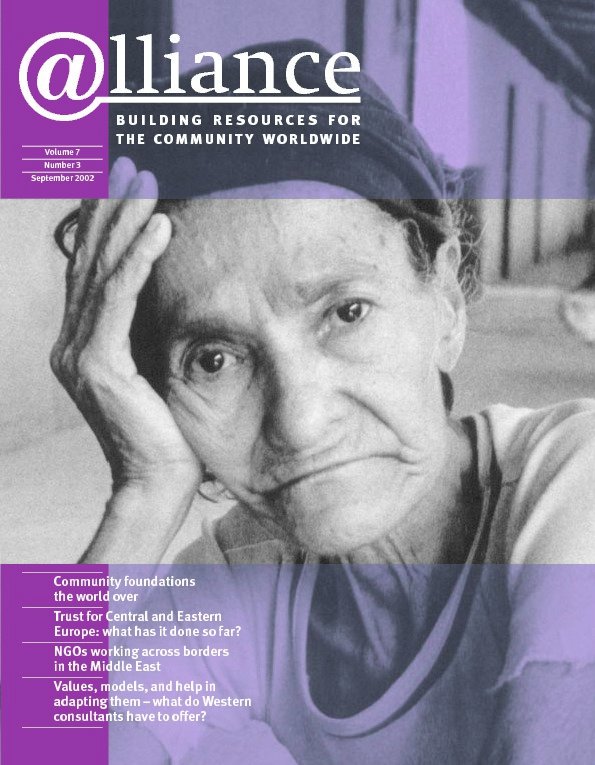‘The pampered parasites of the new world order are not the participants but the protesters,’ said the UK Daily Telegraph newspaper after the Prague/IMF meetings. In the wake of Seattle and now Prague, NGOs are both more visible and more open to attack than ever before. It is in this context that Michael Edwards’ new pamphlet, NGO Rights and Responsibilities: A new deal for global governance, throws down the gauntlet to both governments and the international NGO community: in order to protect the gains that NGOs have made, it is time to ‘put our house in order’.
Global governance, he writes, ‘is likely to consist, not of a single framework of international law applied through national state authorities, but of a patchwork quilt of agreements negotiated between governments, corporations and citizens’ groups at different levels of the world system’ (p13). But without clear ground rules, these engagements could become a free for all, and the backlash this may cause against NGO involvement could turn back the tide of global citizen action. Edwards’ proposed ‘new deal for global governance’ gives citizens’ groups the right to a louder voice in return for a stronger commitment to their responsibilities.
Edwards’ challenge focuses on three key issues: accountability, accuracy and legitimacy:
Accountability How are northern NGOs accountable to their southern constituencies? Is, for example, a protest against trade talks beneficial to developing countries? And, if not, how are NGOs accountable for any damage they may do?
Accuracy Blanket opposition – to globalization, capitalism, free trade, the World Bank, the IMF – is too simplistic. In fact it tends to meet the far-right protectionist, nationalistic agenda halfway. NGOs must be better researched and better informed if they are to retain credibility.
Legitimacy. What right do NGOs have to speak for the interests of the poor? In what way do NGOs disrupting a meeting represent those who are excluded from the debate? And how can the enormous diversity of the NGO community be channelled into global structures in a democratic way?
It is too soon to set out a detailed blueprint for action, but Edwards does make three broad recommendations:
- A structured voice for NGOs in global governance, but not a formal vote (since civil societies lack satisfactory mechanisms for electing representatives).
- Systems of NGO self-regulation around particular global regimes or institutions, with criteria for assessing accountability, accuracy and legitimacy, and some ultimate arbitration mechanism (like an ombudsman) in the United Nations. Something of this sort already operates for some NGO bodies in the UN.
- A level playing field to ensure all civil society groups can be fairly represented.
The debate ahead
Questions raised at the launch of the pamphlet in London in September gave some pointers to the intensity and richness of the debate within the NGO community that is likely to be sparked off by Edwards’ challenge. Why single out NGOs when everyone else is doing worse? Won’t self-regulation be too intrusive and demanding? Isn’t public education to encourage people to keep an eye on NGOs a better alternative? Or a market mechanism, with the public refusing to support ‘bad’ NGOs? Is there a danger that getting to the table will become an end in itself, and that once there, NGOs will cease to relate to their grassroots constituencies? Who will monitor the monitors? How will we go about establishing criteria for factors like representativeness and legitimacy which go way beyond the mandate of, for example, the UK Charity Commission or the new Philippine NGO self-certification body, which focus solely on more formal aspects of NGO management such as financial accountability and reporting?
Edwards gave some answers to these questions: regardless of the failings of others, NGOs have a moral responsibility to do the best they can because they are driven by values and principles, not the pursuit of power or profit. It is also a tactical mistake to be seen to be ignoring our shortcomings. Yes, there is a danger that acquiring a place at the global table will become an end in itself – ‘It’s quite heady to enter the corridors of power.’ But the pamphlet recommends that ‘ongoing self-policing of the extent to which a group does maintain its ties with some sort of constituency and doesn’t float off into the clouds’ should itself be a criterion for self-regulation. The NGO Steering Committee on the Commission on Sustainable Development has a year-on-year process of accreditation and monitoring, and there are regular intervals at which decisions to censure or expel members can be taken.
No, we haven’t got any template for issues like representativeness and legitimacy. ‘This is new, difficult and sensitive ground. We will need to go quite slowly in exploring this. We will need to devise questions to tease out answers to these very difficult areas. We will have to experiment.’
But he also insisted that this debate is only beginning. Mechanisms for NGO involvement and self-regulation may be different for different global regimes and institutions. ‘Let’s have a thousand flowers blooming and see what works best.’ At this stage the real need is to put the issue on the policy agenda.
To order the pamphlet, please contact Central Books.
Tel +44 20 8986 5488
Fax +44 20 8833 5821
Email mo@centralbooks.com
Website http://www.fpc.org.uk
Price £9.95 plus £1 p+p


Comments (0)